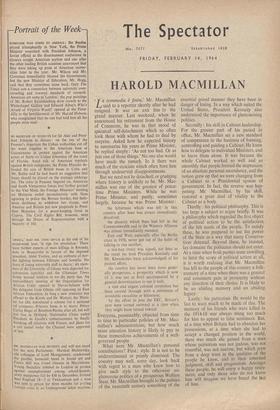HAROLD MACMILLAN
La commedia a finita,' Mr. Macmillan said to a reporter shortly after he had resigned. It was an exit line in the grand manner. Last weekend, when he announced his retirement from the House of Commons, he was in that mood of quizzical self-detachment which so often took those with whom he had to deal by surprise. Asked how he expected history to summarise his years as Prime Minister, he replied simply : 'As not too bad. Or as just one of those things.' No one else would have made the remark. In it there was much of the stoicism which often bore him through undeserved disappointments.
But we need not be detached; or grudging where history is unlikely to be. Mr. Mac- millan was one of the greatest of peace- time Prime Ministers. While he was Prime Minister, and partly, sometimes largely, because he was Prime Minister:
the bitterness which was left in this country after Suez was almost immediately dissolved; the disunity which Suez had left in the Commonwealth and in the Western Alliance was almost immediately mended; East and West, especially after the Berlin crisis in 1958, never got out of the habit of talking to one another; a test-ban treaty was signed, not least as the result (as both President Kennedy and Mr. Khrushchev have acknowledged) of his patient effort; the country has never been more gener- ally prosperous, a prosperity which is now (if it was not at first) accompanied by a general determination to use it well; a vast and urgent colonial revolution has been carried through with a minimum of avoidable casualties or bitterness; by the effort to join the EEC, Britain's eyes were turned outward at a time when they might have turned inward.
Everyone, presumably, objected from time to time to particular policies of Mr. Mac- millan's administrations; but how much more attention history is likely to pay to these tremendous achievements of a well- governed people. • What were Mr. Macmillan's personal contributions? First : style. It is not to be underestimated or primly dismissed. The country may well, some day, look back with regret to a man who knew how to give such style to the otherwise un- glamorous politics of a prosperous Welfare State, Mr. Macmillan brought to the politics of the twentieth century, something of the essential grand manner they have been in danger of losing. In a way which suited the United States, President Kennedy also understood the importance of glamourising politics.
Secondly : his skill in Cabinet leadership. For the greater part of his period in office, Mr. Macmillan set a new, standard of competence in the business of forming, controlling and guiding a Cabinet. He knew how to delegate to individual Ministers, and to leave them alone. It was because the whole Cabinet worked so well and so smoothly that people formed the impression ' of an absolute personal ascendancy, and the "notion grew up that we were changing from a Cabinet to a Presidential system of government. In fact, the reverse was hap- pening. Mr. Macmillan, by his skill, restored a great deal of vitality to the Cabinet as a body.
Thirdly : his political philosophy. This is too large a subject to argue briefly. It was a philosophy which regarded the first object of political action to be the satisfaction of the felt needs of the people. To satisfy these, he was prepared to use the power pf the State in a way that many Conserva- tives detested. Beyond these, he insisted, lay domains the politician should not enter. At a time when both parties seem unwilling, to limit the scope of political action at all, it is worth realising that Mr. Macmillan has left to the people of this country a folk- memory of a time when there, was a general and consistent gain in prosperity without any direction of their choice. It is likely to be an abiding memory and an abiding legacy.
Lastly : his patriotism. He would be the last to want much to be made of this. The memory of his friends who were killed in the 1914.18 war always stung too much for him to appeal to false sentiment. But, at a time when Britain had to abandon her possessions, at a time when she had to accept a changed position in the world, there was much she gained from a man whose patriotism was not jealous, was not resentful, was not narrow, but which grew from a deep trust in the qualities of the people he knew, and in their inherited judgment, skill and pragmatism. Amongst these people, he will enjoy a happy retire- ment; and only those who do not know him will imagine we have heard the last of him.


































 Previous page
Previous page